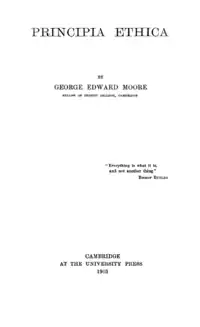| G.E. Moore | |||||
|---|---|---|---|---|---|
.jpg.webp) | |||||
| Persona informo | |||||
| George Edward Moore | |||||
| Naskiĝo | 4-an de novembro 1873 en Upper Norwood | ||||
| Morto | 24-an de oktobro 1958 (84-jaraĝa) en Kembriĝo | ||||
| Tombo | Ascension Parish Burial Ground vd | ||||
| Religio | ateismo vd | ||||
| Lingvoj | angla vd | ||||
| Ŝtataneco | Unuiĝinta Reĝlando (Britio) vd | ||||
| Alma mater | Trinity College • Dulwich College vd | ||||
| Profesio | |||||
| Okupo | filozofo • universitata instruisto vd | ||||
| Laborkampo | filozofio vd | ||||
| Doktoreca konsilisto | James Ward vd | ||||
| Verkado | |||||
| Verkoj | Ethics ❦ Principia Ethica vd | ||||
| |||||
| |||||
| Filozofo | |||||
| vd | Fonto: Vikidatumoj | ||||
George Edward MOORE MO BA (4a de novembro 1873 – 24a de oktobro 1958) estis angla filozofo. Li estis, kun Bertrand Russell, Ludwig Wittgenstein, kaj (antaŭ ili) Gottlob Frege, unu el la fondintoj de la analiza tradicio en filozofio. Kun Russell, li kondukis la apartigon el la idealismo en la brita filozofio, kaj iĝis bone konata pro sia defendo de la konceptoj pri komuna saĝo, siaj kontribuoj al etiko, epistemologio kaj metafiziko, kaj "lia escepta personeco kaj morala karaktero".[1] Li estis Profesoro de Filozofio en la Universitato de Kembriĝo, tre influa inter (kvankam ne membro de) la Grupo Bloomsbury, kaj redaktoro de la influa gazeto Mind. Li estis elektita membro de la Brita Akademio en 1918. Li estis membro de la Kembriĝaj Apostoloj, nome sekreta societo de intelektuloj, ekde 1894 ĝis 1901, kaj de la Klubo de Moralaj Sciencoj de la Universitato de Kembriĝo.

Verkoj
- G. E. Moore, "The Nature of Judgment" (1899)
- G. E. Moore, Principia Ethica (1903)
- G. E. Moore, "Review of Franz Brentano's The Origin of the Knowledge of Right and Wrong" (1903)
- G. E. Moore, "The Refutation of Idealism" (1903)
- G. E. Moore, "The Nature and Reality of the Objects of Perception" (1905–6)
- G. E. Moore, Ethics (1912)
- G. E. Moore, "Some Judgments of Perception" (1918)
- G. E. Moore, Philosophical Studies (1922) [papers published 1903–21]
- G. E. Moore, "The Conception of Intrinsic Value"
- G. E. Moore, "The Nature of Moral Philosophy"
- G. E. Moore, "Are the Characteristics of Things Universal or Particular?" (1923)
- G. E. Moore, "A Defence of Common Sense" (1925)
- G. E. Moore kaj F. P. Ramsey, Facts and Proposition (Symposium) (1927)
- G. E. Moore, Some Main Problems of Philosophy (1953) [prelegoj de 1910–11]
- G. E. Moore, Ch. 3, "Propositions"
- G. E. Moore, Philosophical Papers (1959)
- G. E. Moore, Ch. 7: "Proof of an External World"
- "Margin Notes by G. E. Moore on The Works of Thomas Reid (1849: With Notes by Sir William Hamilton)".
- G. E. Moore, The Early Essays, edited by Tom Regan, Temple University Press (1986).
- G.E. Moore, The Elements of Ethics, edited and with an introduction by Tom Regan, Temple University Press, (1991).
- G. E. Moore, On Defining "Good," in Analytic Philosophy: Classic Readings, Stamford, CT: Wadsworth, 2002, pp. 1–10. ISBN 0-534-51277-1.
Notoj
- ↑ "Moore, George Edward". Preston, Aaron. Internet Encyclopedia. Iep.utm.edu. 30a de decembro 2005. Alirita la 9an de novembro 2019.
Bibliografio
- Levy, Paul (1979). Moore: G.E. Moore and the Cambridge Apostles. ISBN 978-0-03-053616-8.
- Klemke, E. D. (1999). A Defense of Realism: Reflections on the Metaphysics of G. E. Moore. ISBN 1-57392-732-5.
- Daval, René, Moore et la philosophie analytique, 1997, Presses Universitaires de France (PUF), ISBN 978-2-13-048690-9
- Tom Regan. Bloomsbury’s prophet: G.E. Moore and the development of his moral philosophy, Temple University Press (1986).